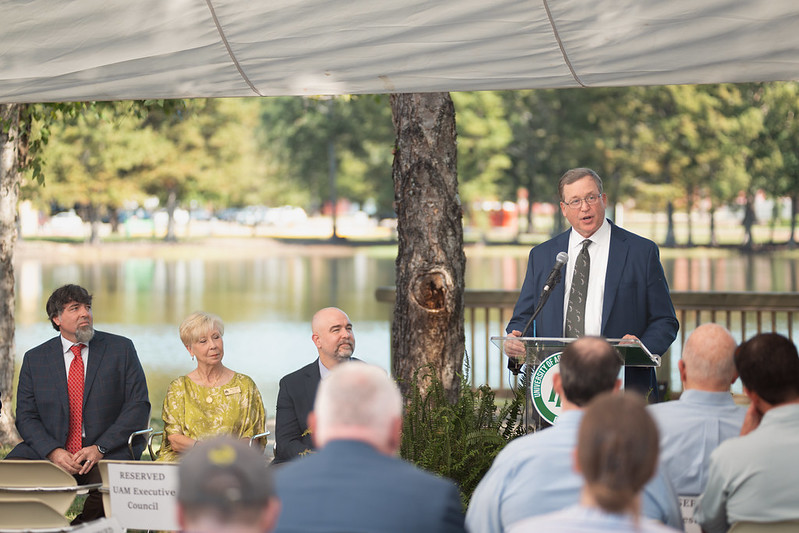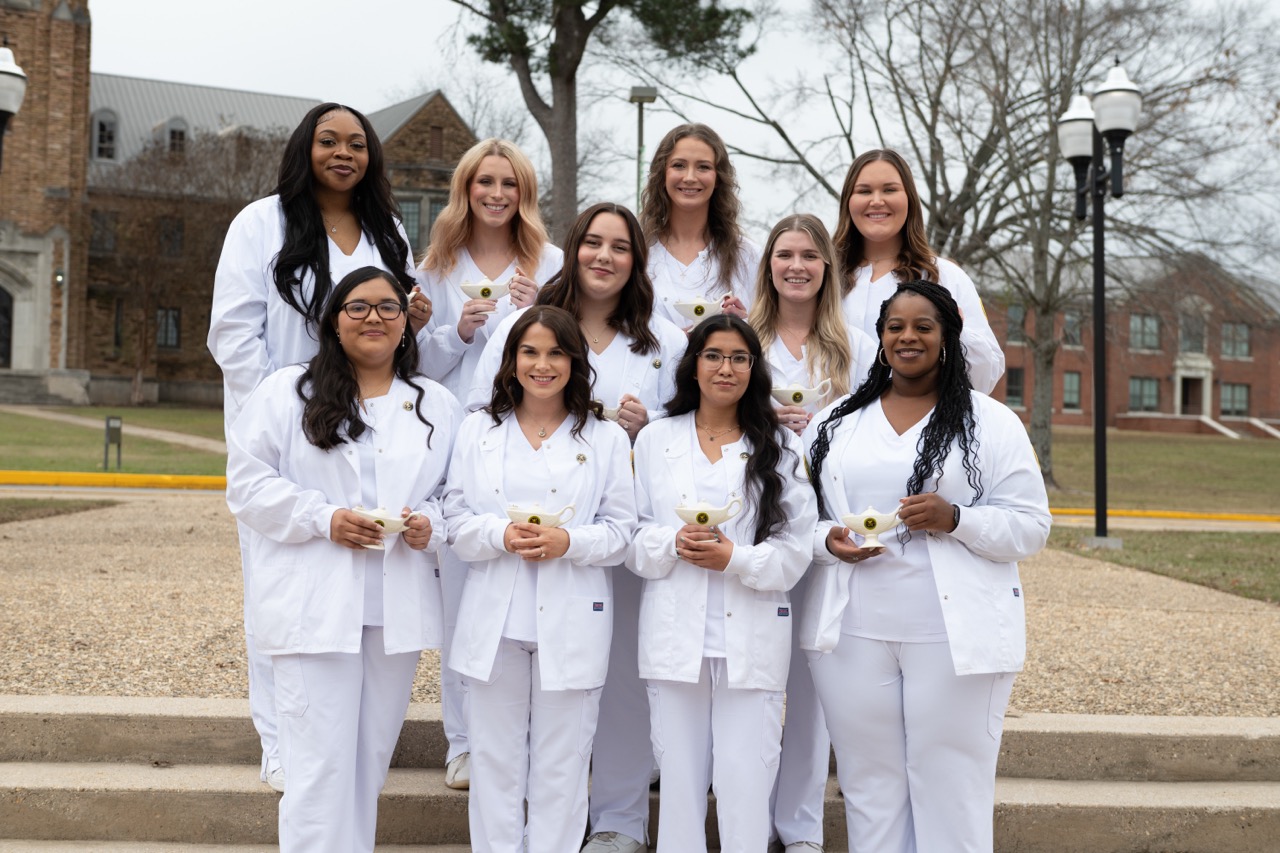By Kelsey Englert
University of Arkansas at Monticello
MONTICELLO, Ark. — A new waterfowl research center that aims to advance waterfowl and wetlands research and transform the industry was announced on Monday during a ceremony at the University of Arkansas at Monticello.
The event, co-hosted with the University of Arkansas System Division of Agriculture, marked the creation of the Snowden Waterfowl Center of Excellence and the Dyke-Snowden Endowed Chair of Waterfowl and Wetlands. Government and higher education leaders from across the state were in attendance, including Arkansas Gov. Sarah Huckabee Sanders, who participated in the announcement of the center and endowed chair, made possible through $7 million in contributions.
The project received initial funding during the 2022 Arkansas legislative session when the Division of Agriculture received a $1 million appropriation toward a waterfowl and wetlands endowed chair at UAM. The funds were accompanied by a challenge to raise $1 million in private contributions to complete the $2 million endowment.
David Snowden, Arkansas waterfowl conservationist, and Merritt Dyke, chairman of Dyke Industries, led a group of donors, successfully raising $1 million in private funds for the Dyke-Snowden Endowed Chair of Waterfowl and Wetlands and an additional $5 million in private funds to create the Snowden Waterfowl Center of Excellence. Last year, Ducks Unlimited also made significant contributions, which were used to create an endowed professorship in wetlands and waterfowl conservation at UAM.
Michael Blazier, professor and dean of the College of Forestry, Agriculture and Natural Resources at UAM, spoke at Monday’s announcement, expressing confidence in the waterfowl research center’s upcoming impact.
“All these developments have positioned our campus to be a national leader in waterfowl research, education and outreach,” he said. “It’s a perfect fit for the state known as the duck hunting capital of the world and the region of that state where a lot of the best of that hunting happens.”
The Snowden Waterfowl Center of Excellence is a Division of Agriculture research center that will be housed at UAM as part of the Arkansas Forest Resources Center. Directed by Blazier, the Arkansas Forest Resources Center conducts research and extension activities through the Arkansas Agricultural Experiment Station and the Cooperative Extension Service, the University of Arkansas System Division of Agriculture’s research and outreach arms.
During the announcement, Deacue Fields, vice president for agriculture of the Division of Agriculture, expressed gratitude to key contributors like Snowden and Dyke, noting their “vision, combined with the foundation that Douglas Osborne has laid, will transform the waterfowl industry, locally and nationally.”
Douglas Osborne, professor of wildlife ecology at UAM, will serve as the inaugural director of the center and the Dyke-Snowden Endowed Chair of Waterfowl and Wetlands. Blazier noted that Osborne’s 13-year tenure at UAM was instrumental in establishing the center.
“When Douglas Osborne started here in 2012, he recognized that Arkansas is the prime wintering grounds for waterfowl for North America and set out to build one of the top research programs and education programs for waterfowl and wetlands in the country,” he said.
Blazier also reflected on the history of UAM’s waterfowl program, noting that four years ago, UAM and the Division of Agriculture joined with George Dunklin to form the Five Oaks Ag Research and Education Center, which was a major step in increasing the scale of UAM’s waterfowl program.
“That partnership has produced a graduate certificate program specializing in waterfowl habitat and recreation management that gives our students a really unique opportunity to learn habitat management through living, working and studying out at the Five Oaks facility,” he said.
Osborne, who is also part of the Division of Agriculture’s experiment station, highlighted how the new center will build on that progress by developing a premier waterfowl program aimed at preparing highly skilled graduates to make a significant impact across the nation.
“To my knowledge, our Snowden Waterfowl Center is the only ‘Center of Excellence’ designated to waterfowl in the country — something that we should be very proud of,” he said. “We’re going to use this for scholarships to recruit students from all over the country.”
Gov. Sanders highlighted the economic impact of waterfowl hunting in Arkansas, noting that hunters contribute more than $300 million each year during the 72 days of the waterfowl season, equating to $4 million daily, which supports communities across the Delta.
“But as you know, duck hunting is much bigger than that,” she said. “For many Arkansas families, a kid’s first duck hunt is a rite of passage. It’s part of our identity. It’s part of the Arkansas story, and this center is coming into being at a time when, unfortunately, that way of life is under threat.
“It’s no secret that waterfowl populations are falling. If we want to ensure that our kids and our grandkids can enjoy the same traditions that we do, we have to make investments today that will help ensure that that happens,” Sanders said.
She thanked the donors, including Snowden and Dyke, and the leaders within the University of Arkansas System for committing to this research and conservation effort.
University of Arkansas System President Jay B. Silveria reiterated the center’s importance, stating, “This is going to expand our ability to conduct worldwide research, educate future leaders and strengthen Arkansas’ legacy as a hub for conservation and natural resource management.”
Peggy Doss, chancellor of UAM, thanked the governor and donors and celebrated UAM’s fruitful partnership with the Division of Agriculture. “It is an extraordinary example of the collaborative spirit that we have as we join our resources together, driving new, innovative initiatives such as this.
“The Snowden Waterfowl Center of Excellence is a unique national model,” Doss emphasized. “Mr. Snowden’s lifelong passion for Arkansas’ natural resources and his unwavering commitment to ensuring their sustainability are at the very heart of this endeavor. His vision, shared by Mr. Dyke, extends far beyond today, as the vision that unites research, education and conservation to create opportunities for students and to protect Arkansas’ treasured wetlands for generations to come.”
Snowden also offered remarks at the event, stating that the center will “be a sought-after destination for those seeking wildlife degrees with an emphasis in waterfowl and a source for well-funded, peer-reviewed research.
“The Snowden Waterfowl Center of Excellence will not only attract the best and brightest students to UAM but will also attract top-flight educators and researchers due to its sustainable funding model,” Snowden said.
To learn more about the Division of Agriculture research, visit the Arkansas Agricultural Experiment Station website. Follow us on X at @ArkAgResearch, and sign up for our monthly newsletter, the Arkansas Agricultural Research Report. To learn more about the Division of Agriculture, visit uada.edu. Follow us on X at @AgInArk. To learn about extension programs in Arkansas, contact your local Cooperative Extension Service agent or visit uaex.uada.edu.
About the Division of Agriculture
The University of Arkansas System Division of Agriculture’s mission is to strengthen agriculture, communities, and families by connecting trusted research to the adoption of best practices. Through the Agricultural Experiment Station and the Cooperative Extension Service, the Division of Agriculture conducts research and extension work within the nation’s historic land grant education system.
The Division of Agriculture is one of 20 entities within the University of Arkansas System. It has offices in all 75 counties in Arkansas and faculty on three system campuses.
Pursuant to 7 CFR § 15.3, the University of Arkansas System Division of Agriculture offers all its Extension and Research programs and services (including employment) without regard to race, color, sex, national origin, religion, age, disability, marital or veteran status, genetic information, sexual preference, pregnancy or any other legally protected status, and is an equal opportunity institution.
About the College of Forestry, Agriculture and Natural Resources and the Arkansas Forest Resources Center
The College of Forestry, Agriculture and Natural Resources and the Arkansas Forest Resources Center, a University of Arkansas System Center of Excellence, brings together interdisciplinary expertise through a partnership between the University of Arkansas at Monticello and the University of Arkansas System Division of Agriculture. The College and Center are headquartered at the University of Arkansas at Monticello campus, but their programs range statewide with the mission of developing and delivering teaching, research, and extension programs that enhance and ensure the sustainability and productivity of forest-based natural resources and agricultural systems. Academic programs are delivered by the College of Forestry, Agriculture, and Natural Resources through the University of Arkansas at Monticello. Through the University of Arkansas System Division of Agriculture, research is administered by the Arkansas Agricultural Experiment Station, and extension and outreach activities are coordinated by the Arkansas Cooperative Extension Service.
The University of Arkansas at Monticello and the University of Arkansas System Division of Agriculture offer all of their programs and services (including employment) without regard to race, color, sex, national origin, religion, age, disability, marital or veteran status, genetic information, sexual preference, pregnancy or any other legally protected status, and are equal opportunity institutions.






